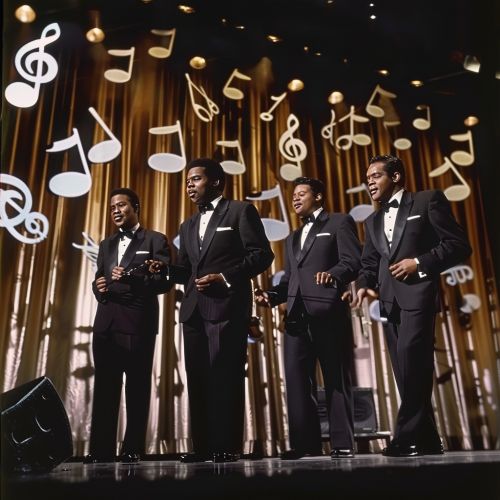The Platters
History
The Platters were an American vocal group formed in 1952. They became one of the most successful vocal groups of the early rock and roll era. The original members were Alex Hodge, Cornell Gunter, David Lynch, Joe Jefferson, Gaynel Hodge, and Herb Reed. Over time, the lineup changed, with Tony Williams, Zola Taylor, Paul Robi, and others joining the group.
The Platters were initially managed by Ralph Bass and later by Buck Ram, who was instrumental in shaping their sound and securing their first recording contract with Federal Records. Their first major hit came in 1955 with "Only You (And You Alone)," which was followed by a string of successful singles, including "The Great Pretender," "My Prayer," "Twilight Time," and "Smoke Gets in Your Eyes."
Musical Style and Influence
The Platters' music was characterized by smooth harmonies, sophisticated arrangements, and the powerful lead vocals of Tony Williams. Their style blended elements of doo-wop, R&B, and traditional pop, making their sound accessible to a broad audience. The group's ability to cross over from R&B to the pop charts was a significant factor in their success.
Their music often featured lush orchestral arrangements, which were unusual for vocal groups at the time. This approach helped to distinguish them from other groups and contributed to their lasting appeal. The Platters' influence can be seen in the work of later vocal groups and artists who adopted similar styles and arrangements.
Key Members
Tony Williams
Tony Williams was the lead vocalist for The Platters from 1953 to 1960. His powerful and emotive voice was a key element of the group's success. Williams' ability to convey deep emotion in his performances made him one of the standout vocalists of the era.
Zola Taylor
Zola Taylor was one of the first female members of The Platters, joining the group in 1954. Her presence added a new dimension to the group's sound and helped to broaden their appeal. Taylor's contributions were significant in the group's recordings and live performances.
Herb Reed
Herb Reed was the bass vocalist and the only member to be with the group from its inception until his death in 2012. Reed's deep voice provided a solid foundation for the group's harmonies. He was also involved in various legal battles to protect the group's name and legacy.


Discography
The Platters released numerous albums and singles throughout their career. Some of their most notable albums include:
- "The Platters" (1956)
- "The Flying Platters" (1957)
- "The Flying Platters Around the World" (1958)
- "Remember When?" (1959)
- "Reflections" (1960)
Their singles often topped the charts, with "Only You (And You Alone)" and "The Great Pretender" being two of their most enduring hits. The group's ability to produce hit after hit solidified their place in music history.
Legacy
The Platters' impact on the music industry is undeniable. They were one of the first African American groups to achieve crossover success, breaking down racial barriers in the process. Their sophisticated sound and polished performances set a standard for vocal groups that followed.
The group's music continues to be celebrated and covered by artists across various genres. Their influence can be seen in the work of later vocal groups such as The Temptations, The Drifters, and The Supremes. The Platters were inducted into the Rock and Roll Hall of Fame in 1990, a testament to their enduring legacy.
Legal Battles
Throughout their career, The Platters faced numerous legal challenges, particularly concerning the use of their name. Herb Reed, in particular, was involved in several lawsuits to protect the group's name from unauthorized use. These legal battles highlighted the complexities of trademark issues in the music industry and underscored the importance of protecting artistic legacy.
